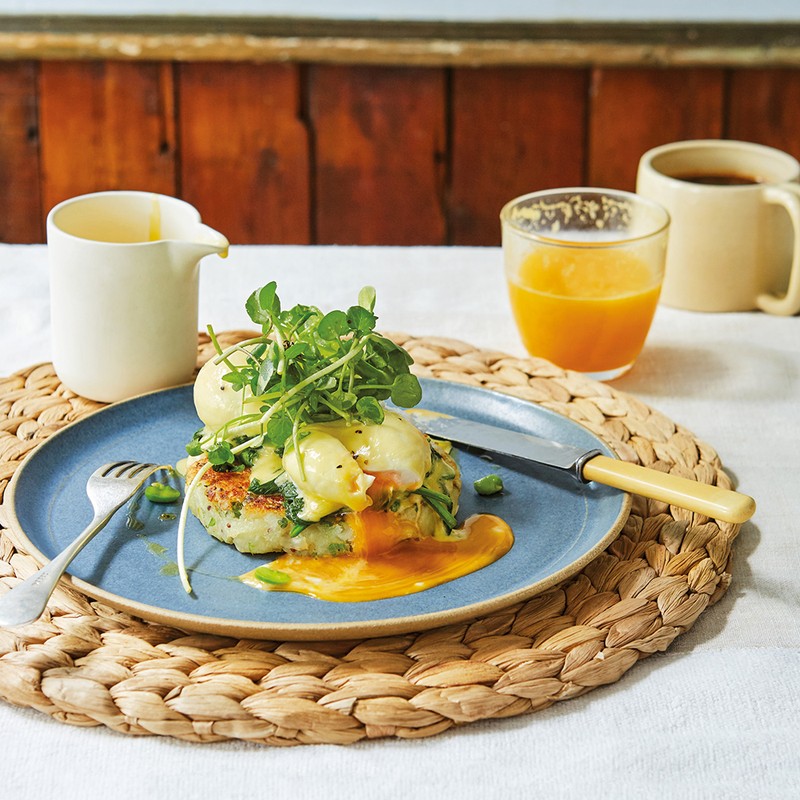Expert Tips For Cooking Excellent Eggs At Home
Scrambled Eggs
In our opinion, it’s best to not overcook the eggs as doing so removes all the goodness the egg holds – a runny yolk or soft scrambled eggs are everything from an indulgence point of view. At the café, we always serve our eggs – any style – with toasted sourdough. We like to serve our scrambled eggs with avocado and sliced tomato, but streaky bacon or chorizo are also really delicious. And then there is kiln-smoked salmon – it tastes incredible.
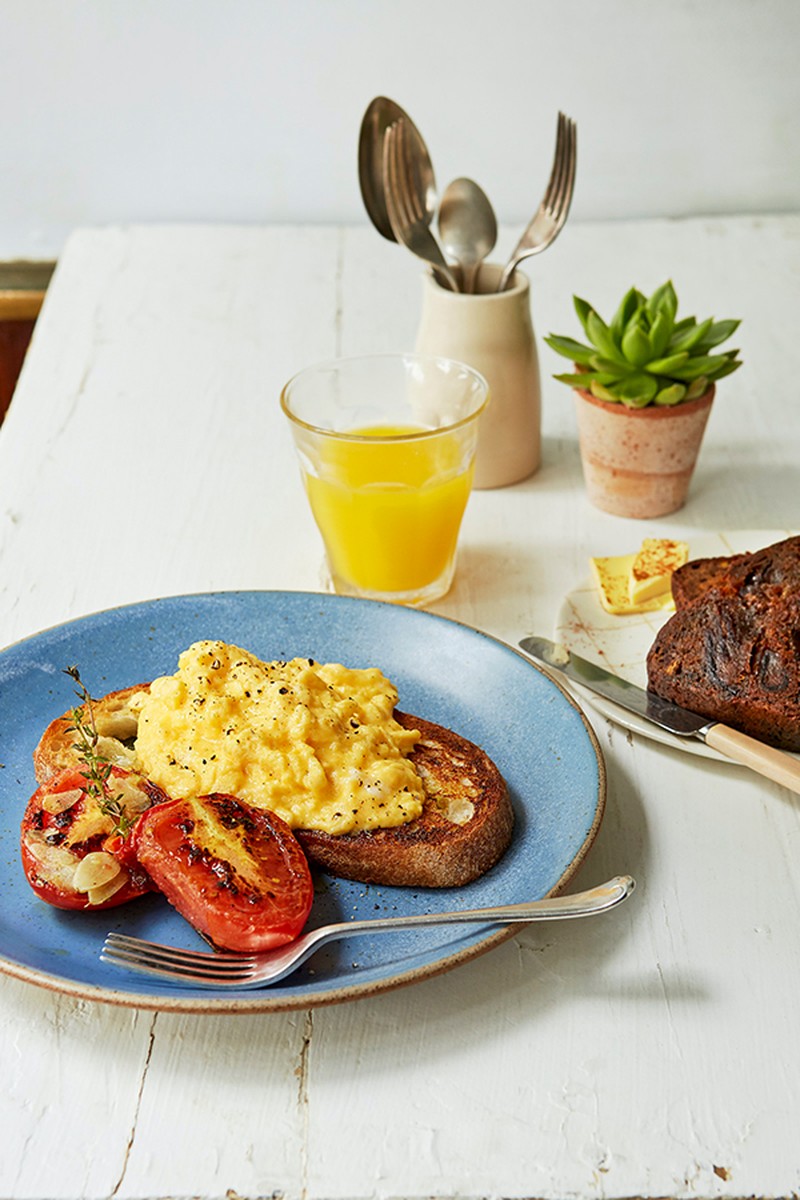
Scrambled Eggs On Toasted Sourdough
INGREDIENTS
- 5 large eggs
- 3 tbsp of double cream
- Pinch of sea salt
- 20g of unsalted butter, plus extra for spreading
- 2 thick slices of sourdough bread, to serve
For the tomatoes:
- 2 plum vine tomatoes
- 1 sprig of thyme
- 1 garlic clove
- 1 tbsp of olive oil, plus extra for drizzling
- Sea salt and black pepper
METHOD
- Preheat the oven to 170ºC fan/190ºC/375ºF/Gas 5 and line a small baking tray with parchment.
- Cut the tomatoes in half lengthways and place on the prepared baking tray. Season with salt and pepper, add the thyme and garlic, and drizzle with the 1 tablespoon of olive oil. Roast for 15 minutes until lightly coloured and just cooked.
- Crack the eggs into a mixing bowl and whisk for a few minutes until the eggs are well beaten. Add the cream and salt and mix again until fully incorporated.
- Put the butter into a non-stick frying pan and gently melt over a low heat. Add the beaten eggs and continue to stir using a wooden spoon for 6-8 minutes, cooking until the eggs become light and fluffy, but are still quite moist. It’s important to not overcook the eggs or they will become dry.
- While the eggs are scrambling, toast the bread and butter generously. To assemble, place a slice of toast on each plate and divide the scrambled eggs between the slices. Place the roasted tomatoes on the side, drizzle with olive oil and serve.
Poached Eggs
A lot of people tell us poached eggs are quite daunting, but really they’re not so hard. It’s simply about the freshness and quality of the eggs. Make sure you use the freshest eggs you can (old eggs won’t hold together while poaching) and preferably use organic eggs. The vinegar is also essential to get a good poached egg – don’t attempt to make them without it as your poached eggs will be flat and sad, and you won’t get that awesome teardrop shape. And don’t be fooled into fiercely boiling the water – a gentle simmer is key so the bubbling doesn’t break up the eggs. You can cook your eggs in advance too. This can be done the night before if you have a brunch planned for the next day. It really does take the stress away from cooking breakfast for groups. Just store the poached eggs in a bowl of water in the fridge.
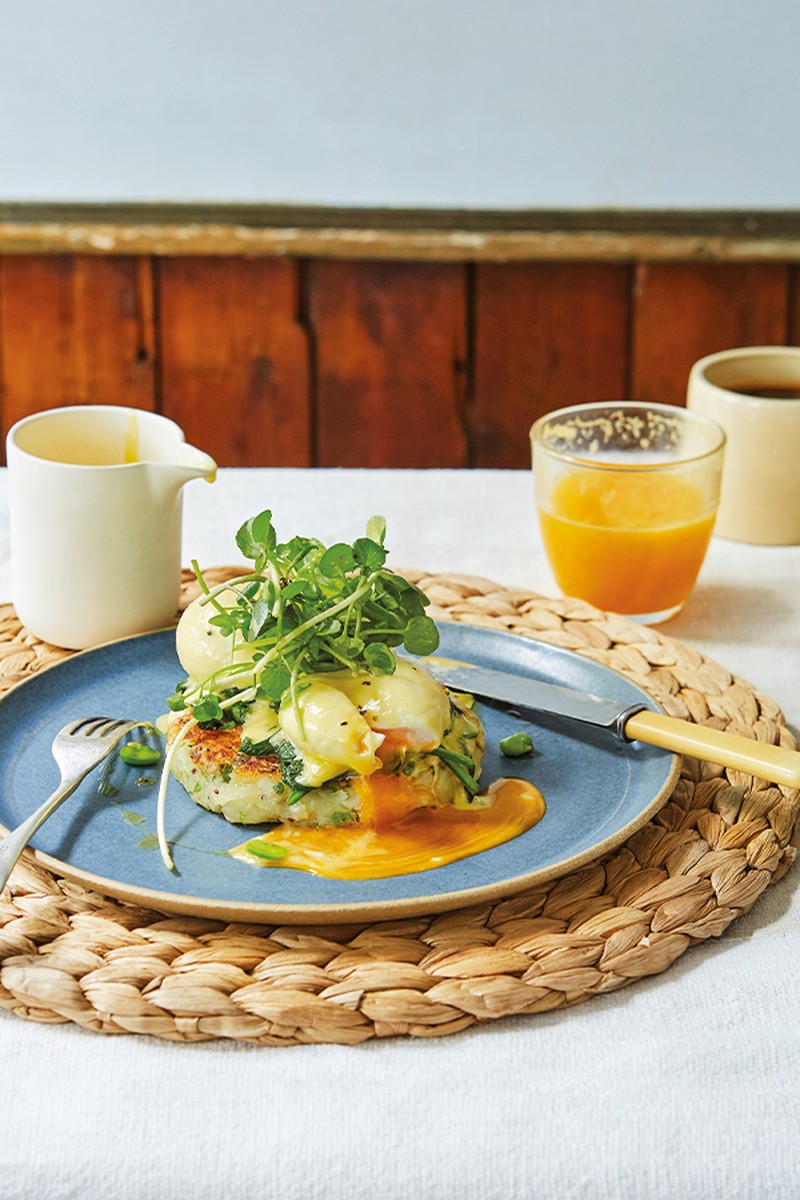
Salt Cod Potato Benedict With Poached Eggs & Hollandaise
INGREDIENTS
- 300g of skinless cod fillet
- 200g of table salt
- 350g of Maris Piper potatoes, peeled and chopped into even-sized pieces
- 4 spring onions, finely sliced
- 30g of flat leaf parsley, chopped
- Grated zest of ½ lemon
- Plain flour, for dusting
- Vegetable oil, for frying
- A knob of butter
- 150g of baby spinach
- Sea salt and black pepper
For the poached eggs:
- 4 eggs
- 4 tbsp of white wine vinegar
To garnish:
- 1 handful of baby watercress
- Olive oil, to drizzle
For the hollandaise:
- 2 large egg yolks
- 125g of clarified butter, melted
- 1 tsp of lemon juice
- Pinch of sea salt
- ½ tsp of rapeseed oil
- ½ banana shallot, sliced
- ½ garlic clove, chopped
- 1 bay leaf
- 1 sprig of thyme
- 1 small sprig of rosemary
- 4 black peppercorns
- 125ml of white wine vinegar
- 60ml of white wine
METHOD
- Start by preparing the salt cod the night before. Place the cod in a shallow dish that snugly accommodates it (you can cut the fillet into pieces). Pour over enough salt to cover the fish completely. Cover and refrigerate overnight.
- The next day, rinse the salt off the fish. Discard the salt and liquid that will have collected in the dish and rinse it out. Place the fish back in the dish, cover with fresh cold water and refrigerate for an hour. Drain off and repeat. Drain the fish again and pat dry.
- Next, make the hollandaise. Heat a small pan over a medium heat. Add the rapeseed oil and fry the shallot for 1-2 minutes until softened. Add the garlic, bay leaf, thyme and rosemary and cook for a further 1-2 minutes. Add the peppercorns, along with the vinegar and white wine and simmer for 10-15 minutes.
- Remove the reduction from the heat and allow to cool, then strain, discarding the solids. (If not using straight away, refrigerate until needed. This will keep for up to 3 months in the fridge.)
- Have a small pan of just simmering water at the ready. Place the egg yolks and 1 tablespoon of the reduction into a deep glass or metal bowl that will fit over the pan. Whisk for a few minutes, then put the bowl over the pan of simmering water, making sure the water is not touching the bottom of the bowl. Whisk continuously until pale and thick, for around 3-4 minutes.
- Remove the pan from the heat and very slowly whisk in the melted butter, a little at a time, until it is all incorporated. If added too quickly the sauce may split, so patience is key. Once it is all added, you will have a silky, slightly thick hollandaise. Add the lemon juice and a pinch of salt. Keep in a warm place until needed.
- Bring a small pan of water to the boil, then turn the heat down until the water is at a low simmer and add the cod. Poach gently for 5-6 minutes, or until just cooked. Transfer to a plate and allow to cool slightly then, using a fork, gently break the cod into small flakes. Set aside until needed.
- For the fishcakes, put the potatoes in a pan, cover with water and add a pinch of salt. Bring the water to the boil, then cook for 15-20 minutes, or until tender but not breaking up. Drain the potatoes and leave them to steam dry in a colander for a couple of minutes before returning to the pan. Over the lowest heat possible, allow the potatoes to dry out for another 1-2 minutes then mash the potatoes until you have a lumpy, fluffy mash.
- Empty the mash into a large bowl and allow to cool before adding the salt cod chunks, spring onions, parsley, lemon zest and black pepper to taste.
- Dust your hands and a chopping board with flour and carefully shape the potato mixture into two round patties around 3cm thick. Chill the fishcakes for about 30 minutes to firm up.
- Heat a little oil in a heavy-based frying pan over a medium heat. Fry the fishcakes for around 5 minutes on each side, or until golden and crispy. Remove from the pan and keep warm in the oven on a low heat.
- Bring a large, deep pan of water to a gentle simmer and add the white wine vinegar. Don’t have the water boiling too fiercely or it will break up the eggs. Crack the eggs into 4 separate small bowls, each deep enough to hold 1 egg.
- Stir the water gently to create a whirlpool. Carefully add the eggs from the small bowls one at a time, spacing them out around the pan. After a few seconds the white should start to set around the yolk of the egg and create a teardrop shape. Cook the eggs for 3½ minutes, then remove from the pan with a slotted spoon. Drain on kitchen paper, them trim off any untidy excess white before serving.
- Wipe down the frying pan, then add the knob of butter and melt over a medium-high heat. Add the spinach and cook for a couple of minutes until wilted, then season with salt and pepper. Remove the pan from the heat and drain the spinach in a strainer, gently squeezing out any excess water.
- Place a fishcake on each of two plates. Top with half of the spinach and 2 poached eggs, then cover with a generous amount of hollandaise sauce. Garnish with some baby watercress and a drizzle of olive oil and serve.
Fried Eggs
There are some dishes where only one way with eggs works. Huevos rancheros is one of them. We always use fried eggs with this dish as the yolk ratio to beans and tortillas is perfect. We keep our fried eggs simple and like to eat them sunny side up with delicious runny yolks (although if we are cooking Asian cuisine we love a crispy fried egg too). This recipe is a real crowd pleaser and perfect for a large group as steps 1-4 can be made in advance. The steak is best marinated overnight and if you make the chimichurri a few hours early it allows the flavours to really mingle.
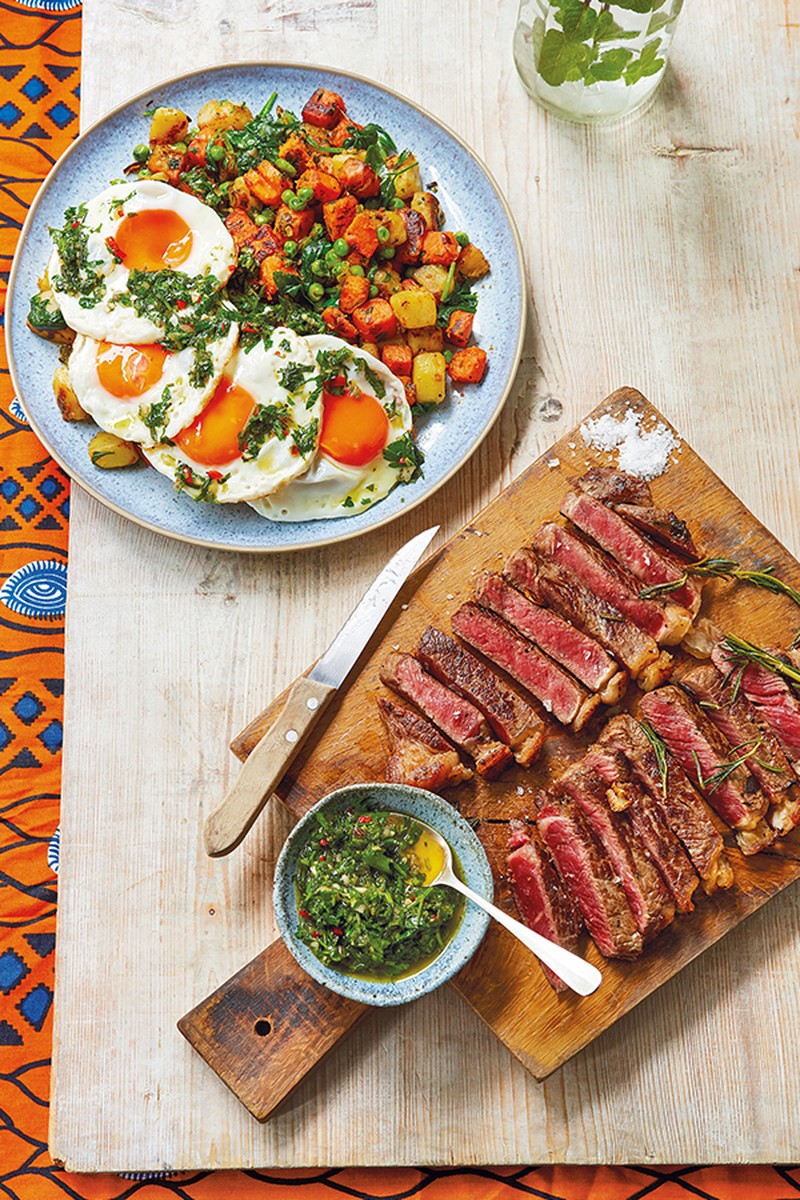
Steak With Sweet Potato Hash, Fried Eggs & Chimichurri
INGREDIENTS
- 2 x 200g sirloin steaks
- 2 garlic cloves, finely sliced
- 2 sprigs of rosemary
- Zest of 1 lemon
- 1 tbsp of olive oil
- 2 tbsp of rapeseed oil
- 4 eggs
For the chimichurri:
- 1 large shallot, finely diced
- 1 large red chilli, deseeded and finely diced
- 4 garlic cloves, finely chopped
- 100ml of sherry vinegar
- 1 tsp of flaked sea salt
- ½ tsp of black pepper
- 25g of fresh coriander, finely chopped
- 25g of flat parsley, finely chopped
- 2 tbsp of fresh oregano leaves
- 250ml of extra virgin olive oil
For the sweet potato hash:
- 500g of orange-fleshed sweet potato, peeled and diced
- 500g of white-fleshed sweet potato (Japanese), peeled and diced
- 500g of Maris Piper potatoes, peeled and diced into 1cm (½in) cubes
- 50ml of olive oil, plus extra for drizzling
- 1 large red onion, finely diced
- 3 garlic cloves, finely diced
- 80g of steamed or boiled peas
- 2 large handfuls of baby spinach
- 5 spring onions, finely diced
- Sea salt and black pepper
METHOD
- First, make the chimichurri. Mix all the ingredients together in a bowl. Cover and refrigerate for a few hours or overnight to allow the flavours to mingle and deepen.
- Next, prepare the steaks; in a dish large enough to accommodate them in a single layer, mix together the garlic, rosemary, lemon zest and olive oil. Add the steaks to the dish and rub the marinade over them, massaging it in to ensure they’re all well covered. Cover and refrigerate for at least 2 hours, or ideally overnight.
- For the hash, bring a large pan of salted water to the boil. Add all the diced potatoes and bring back to the boil. Cook until just tender – this should take about 5-7 minutes. You can test if they’re ready by taking a piece of potato and squashing it between your fingers – if it yields, it’s ready. Transfer to a colander and drain.
- Place the potatoes in a single layer on a baking tray lined with parchment. While they are still warm, drizzle with olive oil, sprinkle with salt and pepper and mix with your hands so they are well coated. Heat 2 tablespoons oil in a large heavy-based frying pan over a medium heat, and sauté the red onion and garlic gently for around 5-6 minutes until soft and golden brown. Remove from the heat.
- Meanwhile, preheat the oven to its lowest setting. Remove the chimichurri and the steaks from the fridge. Discard the garlic and rosemary from the marinade and allow the steaks to come to room temperature while you continue with the potato hash.
- Heat 2 tablespoons of oil in a large heavy-based frying pan on a medium heat. Put the potato cubes in the pan and cook for 15-20 minutes, turning frequently and pressing down with a spatula, until crispy and golden. Add the onion and garlic mixture to the pan, along with the peas, spinach and spring onions. Toss through with the potatoes for a couple of minutes until the spinach has wilted, then season. Remove from the heat and transfer to a large heatproof dish. Place in the preheated oven to keep warm.
- Wipe down the frying pan and return it to a medium-high heat. Season the steaks and place them in the pan. Cook for 2 minutes on each side for medium-rare, or longer to your liking. Remove from the pan, along with any juices, and cover with foil to rest.
- Wipe down the frying pans and return to a medium-high heat. Add the rapeseed oil and let it heat up, then fry the eggs to your liking.
- Slice the steaks. Transfer the hash to a large serving platter and top with the steak and fried eggs. Drizzle generously with the chimichurri and any reserved juices from the steak before serving.
Omelette
Folks have different opinions on this but, based on research we’ve done, it doesn’t harm you to eat eggs every day and it definitely contributes to a healthy diet. On average I’d say we eat eggs four to five days a week. A three-egg omelette is so versatile – you can have it plain or make it more interesting by adding some grated courgettes, baby spinach and a dash of parmesan.
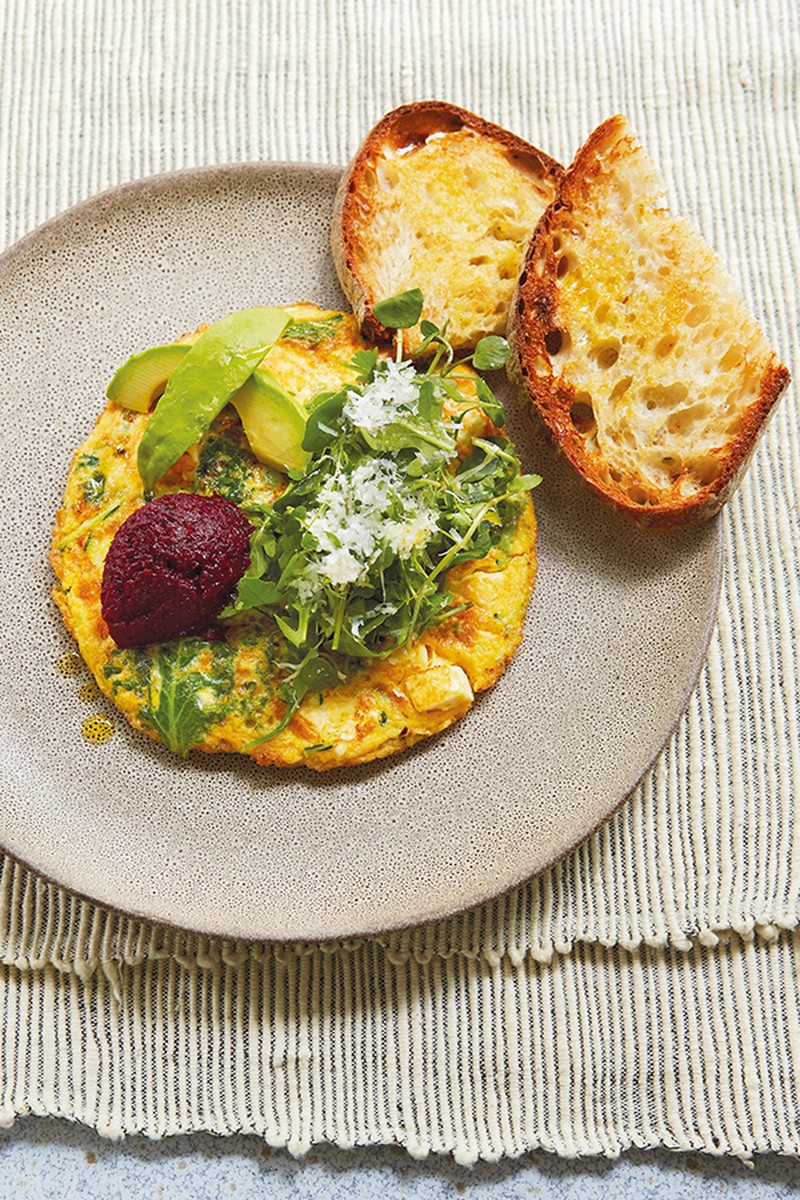
Feta, Kale & Quinoa Omelette
INGREDIENTS
- 50g of kale, stems removed & discarded
- 30g of quinoa
- 6 large eggs
- 50g of feta cheese, roughly crumbled
- 2 tbsp of rapeseed oil
- Sea salt and black pepper
For the beetroot & dill purée:
- 4 medium beetroots, washed
- 2 garlic cloves, peeled
- 2 tbsp of olive oil
- 1 tbsp of apple cider vinegar
- 1 heaped tbsp of thick greek yoghurt
- ½ small bunch of dill, finely chopped
- Sea salt and black pepper
To serve:
- 1 avocado
- 60g of mixed salad leaves (we like rocket, baby spinach, watercress and ruby chard)
- Drizzle of extra virgin olive oil
- 2 slices of good-quality sourdough bread
- Butter, for spreading
- 25g of shaved parmesan cheese
METHOD
- First make the beetroot purée. Put the beetroot into a pan, add a pinch of salt and cover with water, making sure the beetroot is completely submerged. Bring the water to the boil and cook for 1-1¼ hours, or until the beetroot is cooked through. Use a small knife to pierce the beetroot – if the knife goes in easily, it is ready. Drain and set aside to cool for 15 minutes.
- Once cool, remove the skin from the beetroot and cut into quarters. Place the beetroot quarters into a food processor along with the garlic, olive oil and vinegar. Season with salt and pepper, and blend until you have a smooth purée.
- Transfer the purée to a bowl and, using a spatula, fold in the greek yoghurt and dill until fully incorporated. Store in the fridge until ready to serve. It’s good for up to 5 days.
- Preheat the oven to 160ºC fan/180ºC/350ºF/Gas 4.
- Bring a pan of water to a rolling boil and add a good pinch of salt. Add the kale leaves and blanch for 1 minute. Remove with a slotted spoon, retaining the cooking water, and plunge into a bowl of iced cold water (this will stop it from over cooking and keeps the colour vibrant). Drain, roughly chop and set aside.
- To cook the quinoa, rinse well, then add it to the pan of water used for the kale and bring back to a rolling boil. Reduce the heat, and simmer for 15 minutes or until tender. Drain and set aside.
- For each omelette, crack 3 eggs into a bowl and whisk. Add half of the feta, blanched kale and cooked quinoa to each bowl and season to taste.
- Heat 1 tablespoon of rapeseed oil in a 15cm non-stick omelette pan with a wooden handle over a medium heat. When the oil is hot, add a bowl of the egg mixture to the pan, making sure the ingredients are evenly spread across the base.
- Transfer the pan to the preheated oven and cook for 6-8 minutes until the eggs are just set. Remove the omelette from the pan and cover with foil.
- Add another tablespoon of oil to the pan and repeat using the other bowl of egg mixture. (If you have 2 pans, you could cook them simultaneously).
- While the omelettes are cooking, thinly slice the avocado and season with salt and pepper. Dress the salad leaves with a drizzle of olive oil. Toast the sourdough bread, then spread with butter.
- Once both omelettes are cooked, slide each onto a serving plate. Place half the avocado on one half of the omelettes, a spoonful of the beetroot and dill purée and the salad leaves on the other half. Sprinkle the leaves with shaved parmesan and serve with the toast.
Baked Eggs
Baked eggs are very popular as a Middle Eastern-style brunch. Here, we’ve given them a twist, inspired by the traditional fry-up, so you have an English breakfast in one dish. Use heatproof bowls for individual servings. Tip: check the eggs while they’re baking from time to time to avoid overcooking the yolks.
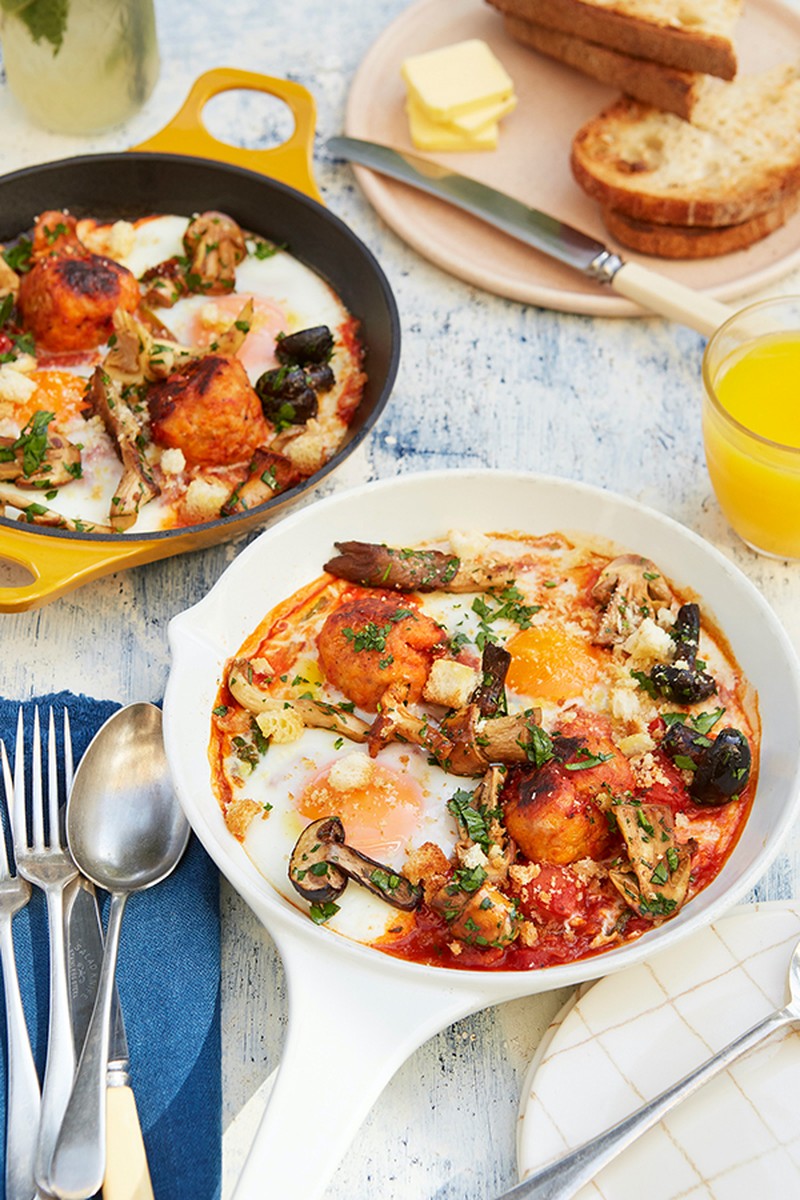
English Breakfast Baked Eggs
INGREDIENTS
- 2 pork sausages
- 2 tbsp of rapeseed oil
- 4 eggs
- 1 tbsp of butter
- 50g of mixed wild mushrooms, sliced
- Buttered sourdough toast, to serve
For the tomato sauce:
- 1 tbsp of rapeseed oil
- 4 rashers of streaky bacon, finely sliced
- ½ onion, finely chopped
- 2 garlic cloves, finely chopped
- 1 x 400g tin of chopped tomatoes
- 1 sprig thyme
- ½ tbsp of caster sugar
- 2 handfuls of baby spinach
- Sea salt and black pepper
METHOD
- First, make the tomato sauce. Heat the oil in a large pan over a medium heat and fry the sliced bacon for about 10 minutes until it is golden brown. Add the chopped onion and garlic to the pan; fry for another 3 minutes until the onion is soft.
- Add the chopped tomatoes, thyme and caster sugar, and season with salt and pepper. Turn the heat down and gently cook for 15 minutes until the sauce has thickened slightly. Set the sauce aside while you prepare the sausage meatballs.
- Preheat the oven to 160ºC fan/180ºC/350ºF/Gas 4.
- Remove the sausage meat from the skins and roll it into 6 meatballs. Heat 1 tablespoon of the rapeseed oil in a frying pan over a medium heat. Add the meatballs and gently fry them for about 5 minutes, turning during cooking, until they are evenly browned.
- Reheat the tomato sauce until it is hot, then stir in the baby spinach so it wilts in the heat. Divide the sauce between two heatproof bowls and add 3 meatballs to each one. Crack 2 eggs into each bowl. Place the bowls in the preheated oven and cook for about 15 minutes, or until the egg whites are firm and the yolks are soft.
- While the eggs are baking, prepare the wild mushrooms. Heat the butter and the remaining 1 tablespoon oil in a frying pan over a medium heat. Add the mushrooms and fry for about 5 minutes, or until golden brown.
- Remove the baked eggs from the oven and scatter half the mushrooms over each dish. Serve with buttered sourdough toast.
Brunch The Sunday Way is published by Frances Lincoln and is available to buy here
Follow @SundayBarnsbury
DISCLAIMER: We endeavour to always credit the correct original source of every image we use. If you think a credit may be incorrect, please contact us at [email protected].
